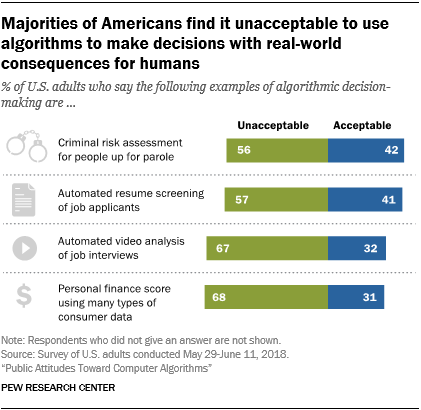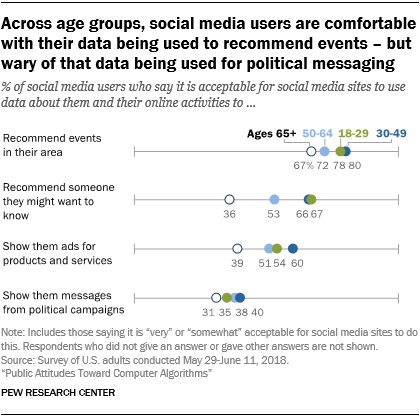Aaron Smith at the Pew Research Center: “Algorithms are all around us, utilizing massive stores of data and complex analytics to make decisions with often significant impacts on humans. They recommend books and movies for us to read and watch, surface news stories they think we might find relevant, estimate the likelihood that a tumor is cancerous and predict whether someone might be a criminal or a worthwhile credit risk. But despite the growing presence of algorithms in many aspects of daily life, a Pew Research Center survey of U.S. adults finds that the public is frequently skeptical of these tools when used in various real-life situations.
This skepticism spans several dimensions. At a broad level, 58% of Americans feel that computer programs will always reflect some level of human bias – although 40% think these programs can be designed in a way that is bias-free. And in various contexts, the public worries that these tools might violate privacy, fail to capture the nuance of complex situations, or simply put the people they are evaluating in an unfair situation. Public perceptions of algorithmic decision-making are also often highly contextual. The survey shows that otherwise similar technologies can be viewed with support or suspicion depending on the circumstances or on the tasks they are assigned to do….
The following are among the major findings.
The public expresses broad concerns about the fairness and acceptability of using computers for decision-making in situations with important real-world consequences
By and large, the public views these examples of algorithmic decision-making as unfair to the people the computer-based systems are evaluating. Most notably, only around one-third of Americans think that the video job interview and personal finance score algorithms would be fair to job applicants and consumers. When asked directly whether they think the use of these algorithms is acceptable, a majority of the public says that they are not acceptable. Two-thirds of Americans (68%) find the personal finance score algorithm unacceptable, and 67% say the computer-aided video job analysis algorithm is unacceptable….
Attitudes toward algorithmic decision-making can depend heavily on context
Despite the consistencies in some of these responses, the survey also highlights the ways in which Americans’ attitudes toward algorithmic decision-making can depend heavily on the context of those decisions and the characteristics of the people who might be affected….
When it comes to the algorithms that underpin the social media environment, users’ comfort level with sharing their personal information also depends heavily on how and why their data are being used. A 75% majority of social media users say they would be comfortable sharing their data with those sites if it were used to recommend events they might like to attend. But that share falls to just 37% if their data are being used to deliver messages from political campaigns.
In other instances, different types of users offer divergent views about the collection and use of their personal data. For instance, about two-thirds of social media users younger than 50 find it acceptable for social media platforms to use their personal data to recommend connecting with people they might want to know. But that view is shared by fewer than half of users ages 65 and older….(More)”.

